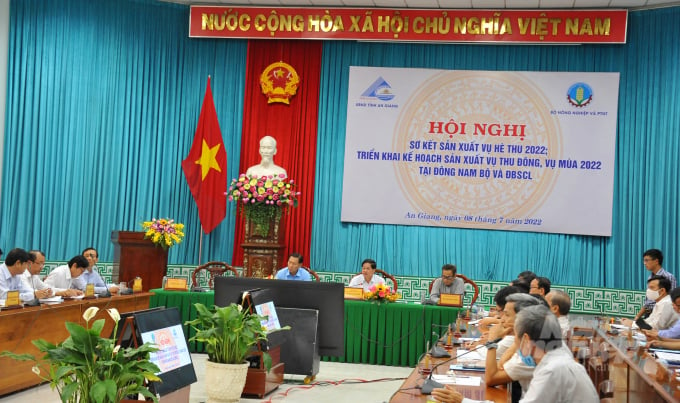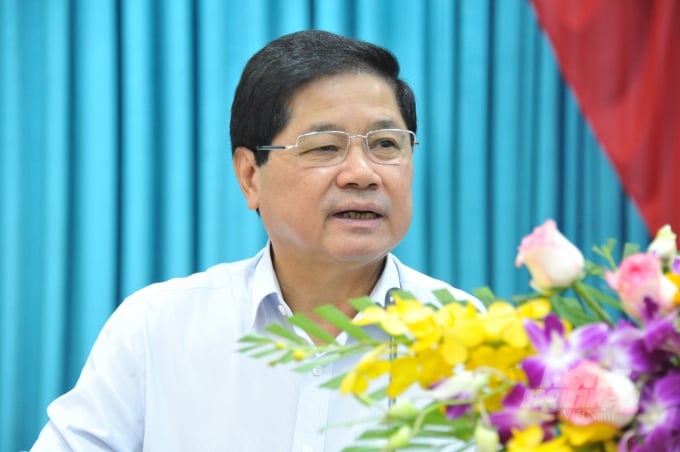May 21, 2025 | 03:34 GMT +7
May 21, 2025 | 03:34 GMT +7
Hotline: 0913.378.918
May 21, 2025 | 03:34 GMT +7
Hotline: 0913.378.918

Conference to review the 2022 summer-autumn crop and implement the production plan for the autumn-winter and the 2022 crop in the South. Photo: Le Hoang Vu.
On July 8, the Ministry of Agriculture and Rural Development, in collaboration with An Giang province, held a conference to review crop production for the summer-autumn crop 2022 and implement the production plan for the autumn-winter and 2022 winter crops in the South, chaired by Deputy Minister of Agriculture and Rural Development Le Quoc Doanh.
According to Mr. Le Thanh Tung, Deputy Director of the Department of Crop Production (Ministry of Agriculture and Rural Development), in the 2022 summer-autumn crop, the whole Southern region sows 1,575 million hectares of rice, a decrease of 20,000 hectares compared to the previous summer-autumn crop. The Mekong Delta region has planted nearly 1.5 million hectares, down 156,000 hectares; the Southeast region sows 82,000 hectares, down 3,600 hectares. The whole Mekong Delta has harvested over 400,000 summer-autumn rice hectares/1.5 million hectares, with an average yield of 6-6.5 tonnes/hectare.
The summer-autumn rice crop in the Mekong Delta is considered a complete victory, with few pests and diseases and profitable in the context of the problematic situation of high fertilizers, pesticides, and gasoline prices.
Hau Giang is the leading province in implementing summer-autumn rice production very effectively. Farmers here have reduced the amount of fertilizer used by more than 30%, but the yield has increased by 10% compared to last year's summer-autumn crop. This result is thanks to the change in farming and timely application of technical advances such as IPM, "3 decrease 3 increase" and "1 must 5 decrease".
Director of the Southern Plant Protection Center Do Van Van added that pest attack rice regularly this year and is well controlled. It is the best news compared to the previous summer-autumn rice crops.
Summer-autumn rice can still appear with complex diseases such as grain blight and cotton-neck blasts. The plant protection industry recommends that localities take appropriate preventive measures to ensure the full yield of the 2022 summer-autumn rice crop.
Mr. Ung Hong Nghi, Deputy Director of the Tien Giang Department of Agriculture and Rural Development, said that despite the high price of agricultural inputs and other impacts, the summer-autumn rice yield of Tien Giang was still guaranteed as planned. The rice yield is from 5.9-6.1 tonnes/ha, and the output is about 400 thousand tonnes. Over 85% of high-quality rice is grown.
At the beginning of the season, the province's agricultural sector encouraged farmers to apply such as reducing fertilizers, reducing pesticides, and reducing varieties to over 75% of the area.

Deputy Minister of Agriculture and Rural Development Le Quoc Doanh hosted the conference. Photo: Le Hoang Vu.
In the 2022 autumn-winter, the Mekong Delta is expected to sow 700,000 hectares of rice, down 3,500 hectares over the same period, the yield is estimated at 57.12 quintals/hectare, and the output is 4 million tonnes, up 17,000 tonnes. As for the 2022 crop, the whole Southern region plans to sow 268,500 hectares of rice, including 172,000 hectares in the Mekong Delta and 96,500 hectares in the Southeast, with a total rice production estimated at 1.3 million tonnes, an increase of 150,000 tonnes.
Mr. Nguyen Si Lam, Director of An Giang Department of Agriculture and Rural Development, said: An Giang ensures the targets, productivity, and output assigned by the Ministry of Agriculture and Rural Development. To do this, the local agricultural sector always focuses on promoting and advising farmers to apply new scientific and technical measures to help farmers reduce costs and increase profits.
Recently, An Giang Provincial People's Committee signed a contract with Loc Troi Group to cover more than 50% of the province's sticky rice area and apply high-quality planting to export sticky rice to Europe.
Deputy Minister of Agriculture and Rural Development Le Quoc Doanh, general assessment: The 2022 winter-spring rice crop is unaffected by drought and salinity. Summer-autumn rice is not attacked by pests and diseases, especially in the Mekong Delta, which is well invested in irrigation.
To contribute to the success of this year's summer-autumn rice crop, the VnSAT project has actively supported Mekong Delta farmers to cultivate rice in a modern way to reduce costs and increase profits.
Deputy Minister Le Quoc Doanh hopes that the summer-autumn rice crop will be successful in the context that all inputs are high. The deputy minister also pointed out that to improve the quality of Vietnamese rice, the only way is to apply synchronous mechanization, apply advanced scientific and technical measures, reduce fertilizer use, and increase the use of organic fertilizers in production.
Regarding the variety structure, localities need to continue to increase the production of high-quality, aromatic, and specialty rice varieties. Also, promote the replication and dissemination of advanced technical models and processes to reduce costs and improve quality, suggested Deputy Minister of Agriculture and Rural Development Le Quoc Doanh.
Translated by Ha Phuc

(VAN) In 2024, over 295 million people across 53 countries and territories faced acute hunger—an increase of almost 14 million people compared to 2023, while the number of people facing catastrophic levels of hunger reached a record high.

(VAN) World Environment Day 2025 (June 5) carries the theme 'Beat Plastic Pollution' continuing to emphasize the global urgency of addressing the plastic waste crisis.

(VAN) This was the assessment shared by experts at the workshop titled 'Assessing the Role and Potential of Low-Emission Rice Production Systems in Vietnam,' held on the morning of May 19.

(VAN) Cai Rong Port is the fisheries control center of Quang Ninh, helping to monitor fishing vessels, combat IUU fishing, and remove the EC's 'yellow card'.

(VAN) The German Agricultural Society (DLG) explores the possibility of establishing a mechanization service center in Vietnam’s Mekong Delta to support farmers in accessing and utilizing advanced machinery.

(VAN) On May 16, the Department of Water Resources Management, in collaboration with the Food and Agriculture Organization of the United Nations (FAO), held a signing ceremony for the GEF-8 project document.

(VAN) Food safety, mechanization, vocational training, and market opening are key areas of cooperation expected between the Vietnamese Government and the Federal Republic of Germany.